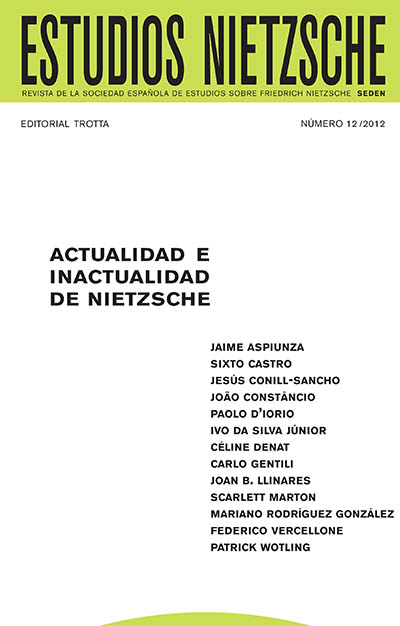The Domain of Interpretation
DOI:
https://doi.org/10.24310/EstudiosNIETen.vi12.10552Keywords:
interpretation, beauty, artAbstract
In this paper, I review the ideas of artistic interpretation and of work of art in the light of Nietzsche’s ideas, and these in the light of some contemporary ontological, epistemological and aesthetic thesis. I analyze the discredit of taste in contemporary art in terms of resentment and guilt, following the Nietzschean analysis in The Genealogy of Morals. Finally I stress the importance of beauty in Nietzsche’s writings on art as a
reminder for future art.
Downloads
Metrics
References
Belting, H., Imagen y culto. Una imagen anterior a la era del arte. Madrid: Akal, 2010
Calinescu, Matei, Cinco caras de la modernidad, Madrid: Tecnos, 2003.
Danto, A. C., Nietzsche as philosopher, New York: Columbia University Press, 1965.
Diéguez, A., «Las bases evolucionistas del realismo nietzscheano», en Estudios Nietzsche 8 (2008), 64-90.
Foucault, M., «¿Qué es un autor», en Entre filosofía y literatura, Barcelona: Paidós, 1999, p. 334.
Goehr, L., TheImaginary Museum of musical Works, Oxford: Oxford University Press, 1992, p. 203.
Goodman, G., «On Starmaking», en P. McCormick (ed.), Starmaking, Cambridge: MIT Press, Mass., 1996, p. 144.
Goodman, Nelson, Los lenguajes del arte, Barcelona: Seix Barral, 1976.
Groys, B., Sobre lo nuevo, Valencia: Pre-Textos, 2005.
Heidegger,M., Nietzsche I, trad. de J. L. Vermal, Barcelona: Destino, 2000.
Margolis, J. Art and Philosophy: Conceptual Issues in Aesthetics, Brighton: Harvester Press.
Margolis, J., «Relativism and Interpretive Objectivity»: Metaphilosophy 31 (2000), 216.
Margolis, J., Pragmatism without Foundations, Oxford: Blackwell, 1986.
Margolis, J., The arts and the definition of the human, Stanford, CA: Stanford University Press, 2009.
Nietzsche, F., Obras Completas, I-IV (OC ). Director ed. Diego Sánchez Meca. Madrid: Tecnos, 2011-2016
Nietzsche, F., Obras Completas, I-IV (OC ). Director ed. Diego Sánchez Meca. Madrid: Tecnos, 2011-2016
Nietzsche, F., Correspondencia I-VI. (CO). Director ed. Luis E. de Santiago Guervós. Madrid : Trotta, 2005- 2012.
Nietzsche, F., Correspondencia I-VI. (CO). Director ed. Luis E. de Santiago Guervós. Madrid : Trotta, 2005- 2012.
Nietzsche, F., Fragmentos Póstumos I-IV (FP). Director ed. Diego Sánchez Meca. Madrid: Tecnos, 2006-2010.
Nietzsche, F., Fragmentos Póstumos I-IV (FP). Director ed. Diego Sánchez Meca. Madrid: Tecnos, 2006-2010.
Putnam, H., Reason, TruthandHistory, Cambridge: Cambridge University Press, 1981.
Ridley, A., «Perishing of the Truth: Nietzsche's Aesthetic Prophylactics»: British Journal of aesthetics 50 (2010),
-437.
Sánchez Meca, D., En torno al superhombre, Barcelona: Anthropos, 1989.
Sánchez Meca, D., La experiencia dionisíaca del mundo, Madrid: Tecnos, 2009.
Santiago Guervós, Luis E. de, Arte y poder. Aproximación a la estética de Nietzsche. Madrid: Trotta, 2004.
Sontag, S. , «Contra la interpretación», en Contra la interpretación, Barcelona: Seix Barral, 1984.
Vattimo, G., Las aventuras de la diferencia, Barcelona: Península, 1989.
Vattimo, G., , «Arte e identidad. Sobre la actualidad de la estética de Nietzsche», en Diálogo con Nietzsche, Barcelona: Paidós, 2002.
Downloads
Published
How to Cite
Issue
Section
License
As of issue 21 (2021) this journal is published only in open access (diamond route).
From that number 21, like the previous numbers published in NIETZSCHE STUDIES, they are subject to the Creative Commons Acknowledgment-NoComercia-ShareIgual 4.0 license, the full text of which can be consulted at <http://creativecommons.org/licenses/by-nc-sa/4.0 >
It is the responsibility of the authors to obtain the necessary permissions of the images that are subject to copyright.
This work is licensed under a Creative Commons Attribution-NonCommercial-ShareAlike 4.0 International License.
Copyright generates two different rights: moral rights and patrimonial rights that EJFB recognizes and respects. Moral rights are those relating to the recognition of the authorship. They are rights of a personal nature that are perpetual, inalienable, unseizable and imprescriptible as consequence of the indivisible union of the author and his/her work.
Patrimonial rights are those that can be derived from the reproduction, distribution, adaptation or communication of the work, among others.







11.png)
